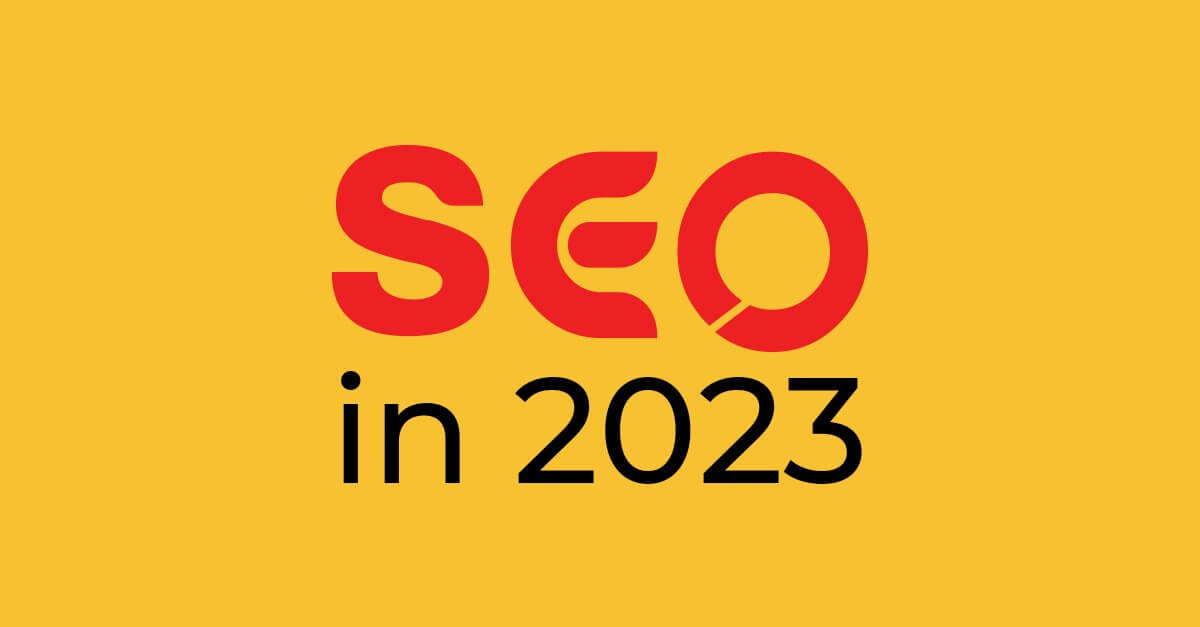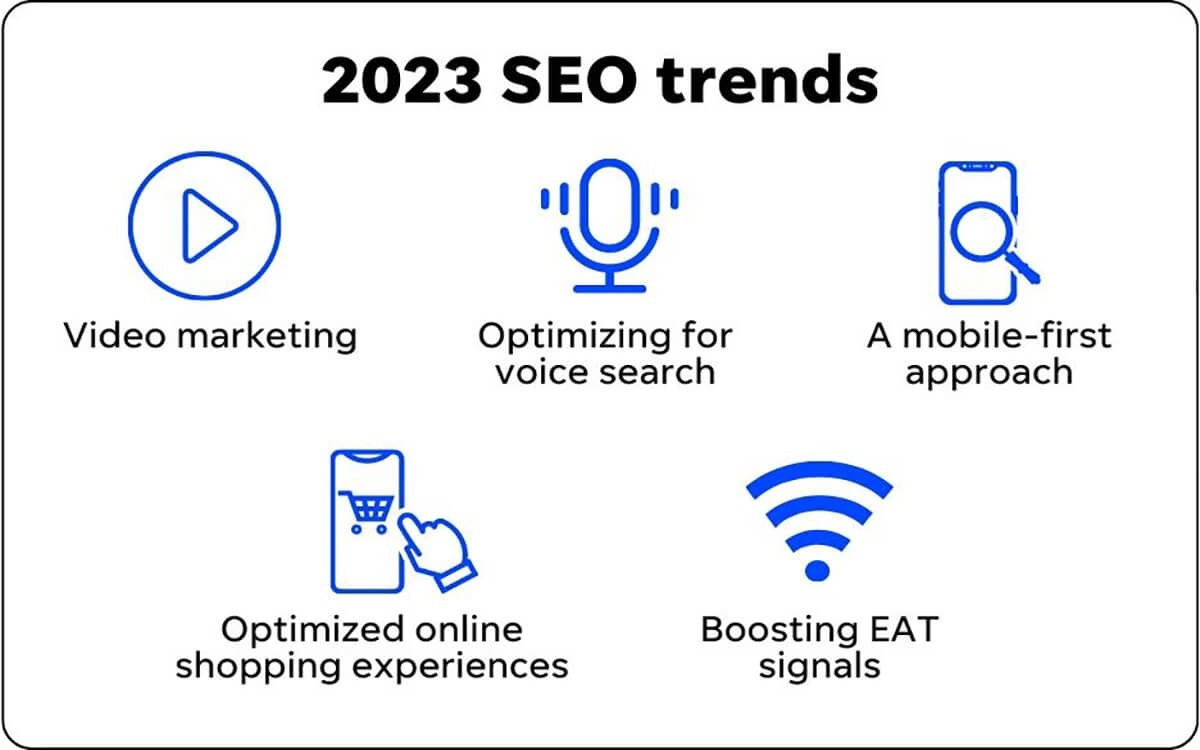When you turn to Google for a step-by-step guide to fixing that unfortunate flat tire, SEO is why you’ll find what you’re looking for.
It’s a hard fact that without at least some presence on Google, your business is facing an uphill battle digitally. Most marketers know the importance of search engine optimization (SEO), and it’s one of the trends they’re investing in the most this year.
In this guide, you’ll learn what SEO is, discover strategies for building your online presence – search engine optimization (SEO) – and how to position your website in search engine results.
1. What is search engine optimization?
SEO stands for Search Engine Optimization. Search engine optimization (SEO) aims to increase a company’s visibility in organic search results. As a result, these efforts drive more visitors to the company’s website, increasing their chances of converting more, resulting in more customers and more revenue.
When asked to explain what SEO is, I often choose to call it a strategy for ensuring that when someone Googles your product or service category, they can find your website.
But this simplifies the discipline a bit.
The SEO of your website pages can be improved in many ways. Elements that search engines look for include title tags, keywords, image tags, internal link structure, and inbound links (also called backlinks). Search engines also look at site structure and design, visitor behavior, and other external, off-site factors to determine how your site should rank in its SERPs.
Taking all of these factors into consideration, SEO primarily drives two things – ranking and visibility.
But before we delve deeper, I want to point out that many resources make SEO look complicated; they might even scare you away. I promise that’s not the case with this guide. I’ll break SEO down to its most basic parts and show you how to use all of its elements to create your own successful SEO strategy.

2. How does SEO work?
SEO works by optimizing your website’s content, conducting keyword research, and obtaining inbound links to improve your content’s ranking and your website’s visibility. While you can usually see the results live on the SERP once search engines have crawled and indexed a web page, SEO efforts can take several months to fully materialize.
1) Ranking list
This is the method used by search engines to determine where to place a specific web page in the SERPs. Ranking starts from position number 0 and continues to the final number of search engine results for the query, and a page can only be ranked one position at a time. Over time, a page’s ranking may change due to age, competition in the SERPs, or algorithm changes in the search engine itself.
2) Visibility
This term describes the prominence of a specific domain in search engine results. Lower search visibility occurs when a domain is not visible for many relevant search queries, and the opposite is true when search visibility is high.
Both are responsible for achieving the main SEO goals – traffic and domain authority.
3. What is the importance of SEO?
There’s a more important reason why you should use SEO: This strategy can actually help you position your brand throughout the buying process. In turn, SEO ensures your marketing strategy matches new buying behavior.
Because, as Google admits, customer behavior has changed permanently. As of July 2023, Google occupied 92.08% of the global search engine market. What’s more, they prefer to do most of the buying process themselves.
For example, 86% of consumers say search engines are the best way to obtain information. People across all generations use search engines to find answers online overwhelmingly. Finally, DemandGen’s 2022 B2B Buyer Survey found that 67% of B2B buyers begin the buying process with a broad web search.
But how do they use search engines in the process?
Google is the first resource they use to find information about their problem early in the process. Some also asked about potential solutions. They then evaluate available alternatives based on reviews or social media hype before asking the company. But this was after they had exhausted all sources of information.
Therefore, your only chance for customers to notice and consider you are to appear in their search results.

4. How does Google know how to rank a page?
Search engines have only one goal. Their goal is to provide users with the most relevant answers or information. Every time you use them, their algorithms select the pages that are most relevant to your query. Then, rank them, showing the most authoritative or popular first.
In order to provide the right information to users, search engines analyze four main factors :
- The meaning behind someone’s query, which is their most likely intent to begin their search, and how that intent matches up with the most helpful content.
- The relevance between a search query and the content of a page, which search engines evaluate through various factors such as topic or keywords.
- Content Quality uses the EEAT (which we discuss further below) model to display the content that appears to be the most helpful based on signals such as expertise, authority, and trustworthiness.
- The usability of the site, taking into account page speed, mobile friendliness, and other factors related to the ease of discovering content on the site.
- Context, which relies on the searcher’s past behavior and settings (e.g. location).
To analyze all this information, they use complex equations called search algorithms.
Search engines keep their algorithms secret. However, over time, SEOs have identified some of the factors they consider when ranking pages. We call them ranking factors, and they are the focus of your SEO strategy.
5. How to monitor and track SEO results
Technical setup, content, and links are crucial for a website to get into search results. Monitoring your efforts can help further refine your strategy.
Tracking traffic, engagement, and links is one way to measure SEO success. While most companies develop their own set of SEO KPIs (Key Performance Indicators), the following are the most common:
- organic traffic growth
- Keyword ranking (divided into brand words and non-brand words)
- Conversion of natural traffic
- Average time on page and bounce rate
- Top landing pages that drive organic traffic
- Number of index pages
- Link growth (including new links and lost links)

6. Conclusion
It follows that no business can survive in the long term without actively positioning its content in search results. By increasing search visibility, you can bring in more visitors, which in turn can lead to conversions and sales. Taking the time to become an SEO expert is well worth it. If you have any questions about SEO, please contact Donsafe for consultation.





Leave A Comment